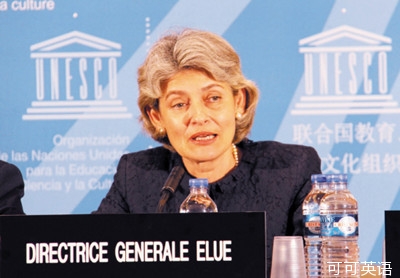Message from Irina Bokova, Director-General of UNESCO, on the Occasion of the International Day of Peace
聯(lián)合國教科文組織總干事伊琳娜·博科娃在國際和平日的致辭
21 September 2013
2013年9月21日
International Day of Peace, which we celebrate on 21 September, is devoted this year to peace education.
今年9月21日“國際和平日”的主題是和平教育。
This message embodies UNESCO’s founding values: since wars begin in the minds of women and men, it in the minds of women and men that the defences of peace must be constructed. Education is the foundation of any lasting peace. It is the driving force behind freedom and tolerance. It stems the tide of ignorance and mutual misunderstanding, the means by which disagreements all too often degenerate into violence. Education fosters the culture of dialogue that is necessary to resolve conflicts.
戰(zhàn)爭起源于人之思想,故務(wù)需于人之思想中筑起保衛(wèi)和平之屏障。這句話體現(xiàn)了教科文組織的基本價(jià)值觀。教育是持久和平的基石,是自由與寬容的原動力。它有助于消除往往使分歧升級為暴力的無知與缺乏相互了解。教育推動解決沖突所必需的對話文化。
That is why UNESCO campaigns for quality education for all going further than the basics of reading and writing. Education must encompass the teaching of human rights, living together and respect for others. Peace education is one of its key components. Every child in the world should know their rights, and learn their own history and that of other peoples, so as to be able to understand the equal dignity of cultures and draw lessons from the crimes and violence of the past. This vision is the key to tolerant citizenship in a globalized world. It requires a widespread effort to train teachers and design suitable school curricula. These principles inspire all of UNESCO’s work, in particular through the International Decade for the Rapprochement of Cultures (2013-2022), adopted by UNESCO’s General Conference and the United Nations General Assembly.
正因?yàn)榇耍炭莆慕M織積極倡導(dǎo)不僅僅包括讀寫基本技能的全民良好教育。教育應(yīng)涵蓋人權(quán)、共同生活以及尊重他人的教育。和平教育是其中一個(gè)重要組成部分。全世界兒童都應(yīng)該了解自己的權(quán)利并學(xué)習(xí)本民族及其他民族的歷史– 從而能夠理解所有文化具有同等尊嚴(yán)并從過去的罪行與暴力事件中吸取教訓(xùn)。這種理念對于全球化時(shí)代培育包容的公民意識至關(guān)重要。它要求大力培訓(xùn)教師并開發(fā)相應(yīng)的學(xué)校課程。這些是教科文組織所有工作,特別是在教科文組織大會和聯(lián)合國大會通過的國際文化和睦十年(2013-2022年)領(lǐng)域開展工作的指導(dǎo)原則。
Education is a fundamental human right, and there can be no justification for depriving anybody of that right. As we mobilize the potential of education to prevent war, we must ensure the quality and continuity of teaching, even in the event of conflict. This is the purpose of UNESCO’s work to protect schools and teachers, and to bring education to refugees and displaced persons. It is also, for UNESCO, the way to lay the foundations of future peace.
教育是一項(xiàng)基本人權(quán),不得以任何理由剝奪任何人的這一權(quán)利。在努力發(fā)揮教育在預(yù)防戰(zhàn)爭方面的作用的同時(shí),我們應(yīng)確保教育的質(zhì)量和連續(xù)性,即便是在發(fā)生沖突的情況下。這是教科文組織保護(hù)學(xué)校和教師以及為難民或流離失所的人們提供教育的意義之所在。它也是教科文組織為未來和平奠定基礎(chǔ)的手段。
With this hope in mind, I call upon all Member States of UNESCO, governments and civil society organizations to join their forces, and to join us to make education a force for peace. We must give to future generations a culture of dialogue and build, through education, a world that is not only more connected, but also more compassionate.
懷著這種期望, 我呼吁教科文組織所有會員國、各國政府和公民社會組織攜起手來,與我們一道努力使教育成為促進(jìn)和平的力量。我們必須為后代人留下對話的文化并通過教育構(gòu)建一個(gè)更為連通、也更加團(tuán)結(jié)的世界。

更多精品翻譯素材,敬請關(guān)注可可英語。











